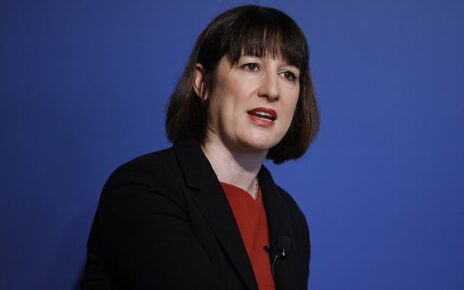The first tip-off is the title: “Murder at Yellowstone City” is not your standard-issue shoot-’em-up. Rather, director Richard Gray’s well-crafted and handsomely mounted indie is as much a solidly constructed mystery as it is it a conventionally satisfying oater, with much to recommend to fans of either genre who rarely get to sample such a mix. Indeed, outside of Henry Hathaway’s “Five Card Stud” (1968) and the lamentably short-lived 2003 TV series “Peacemakers,” it’s hard to recall many other scenarios that suggest what might have resulted had Zane Grey and Agatha Christie bellied up to the bar and swapped ideas.
Only gradually does it emerge that Thomas Jane’s Thaddeus Murphy is the sagebrush sleuth of the piece, as his character — prodded by Anna Camp as Alice, his astute wife and partner — demonstrates surprising pathological skills while attempting to prove the innocence of a suspected killer. Surprising, that is, because Thaddeus is introduced as an idealistic clergyman who tends to his flock in the eponymous city with his missionary spouse, and neither appear at first to be cut out for crime-solving. But that’s before he exhumes the body of a murder victim to discover just what sort of bullet remains lodged in the corpse. And before he confesses to Alice that, back in the bad old days, he did more straight shooting than bible thumping.
It’s 1881 in the Montana Territory, and Yellowstone City, a once-thriving gold-rush boom town, has fallen on hard times. Recently, it has become primarily a sanctuary for people seeking something resembling an inclusive community because, really, they have nowhere else to go. Among the citizenry: Edgar (Richard Dreyfuss) and Mickey (John Ales), aging gay saloonkeepers who maintain a none-too-convincing pretense that they’re just good friends; Violet (Tanaya Beatty), a young Lakota Sioux woman who survived a cavalry attack on her people, and now runs the local livery stable; and Isabel (Aimee Garcia), the Mexican overseer of the saloon girls who also tends to orphans and other needy folks.
And then there is Sheriff James Ambrose (Gabriel Byrne), a stern ex-soldier who isn’t given to unreasonable brutishness, but feel feels totally (and justifiably) confident in his ability to keep the peace because of his fearsome reputation. Unfortunately, that attitude leads him to immediately assume that, when there is a murder in Yellowstone City, a newcomer simply must be responsible because he’d be “the only man who doesn’t know what I’ll do to him.” The beauty part of Byrne’s tightly controlled, fully committed performance is that, even when Ambrose’s determination to preserve law and order escalates into unshakable fanaticism, he stops way short of becoming the movie’s bad guy.
There’s a promise that happy days will be there again when a rowdy prospector (Zach McGowan) strikes a vein of gold on his nearby claim, and announces his intent to share his good fortune with his struggling neighbors. Unfortunately, while riding home to his long-suffering wife (Scottie Thompson), the prospector is shot dead. And Sheriff Ambrose quickly decides the culprit must be the only newcomer in the area: a gentlemanly and well-spoken ex-slave who calls himself Cicero (Isaiah Mustafa) because, “I was raised by myself, or the wind. I go by the name I chose.” (A nice touch: When Cicero quotes Shakespeare to a delighted Edgar, the saloon keeper pointedly warns him not to use Bard speak in front of other folks because, around these parts, people like “to understand what’s being said to them.”)
Cicero winds up behind bars after some of the prospector’s gold is suspiciously uncovered in his room. But Alice doubts his guilt after ministering to him in jail, and continues to plead his case to Thaddeus after Cicero effects an unauthorized release. (And if that sounds vague, well, it’s meant to be. This is a mystery, remember?) As the stranger does his best to avoid recapture, two more murders occur. Ambrose sees this as further proof that his gut instincts were correct. Thaddeus, however, is inclined to pick up a shovel and visit the graveyard.
Working from a first-rate script by Eric Belgau, Gray plays fair while doling out clues until, around the two-thirds mark, he lets us know who’s responsible for the bloody deeds. Better still, he and Belgau go a good way toward putting the sting back into on-screen death by taking time to encourage sympathy for two people who meet violent ends in scenes that are all the more shocking because their killings seem so damned unfair.
The various shootouts and action scenes scattered throughout the final third of “Murder at Yellowstone City” are excitingly and, better still, believably staged. (You don’t often see good guys display the presence of mind to re-arm themselves with the weaponry of foes they’ve just killed.) And the filmmakers see no need to spell everything out for us. All we need is a brief glimpse of Cicero’s horribly scarred back to fully appreciate what he’s already survived. At one point, Edgar and Mickey — whose loving relationship is never played for laughs, except when they’re joking with each other — reveal they more or less adopted Violet when they found her after the massacre. It’s a potent scene, but emotions aren’t unduly milked.
And we never do find out what Thaddeus did, saw and learned in his past life to make him so proficient with firearms and ballistics, and why he “came to God because I was running from the devil.” Alice simply accepts that, when push comes to shove, he can be a hero and, yes, a savior. So can she.
The couple, it should be noted, could fruitfully continue their crime-solving in a sequel, or a TV series spin-off. After all, faith and forensics can move mountains.
Source: Read Full Article
